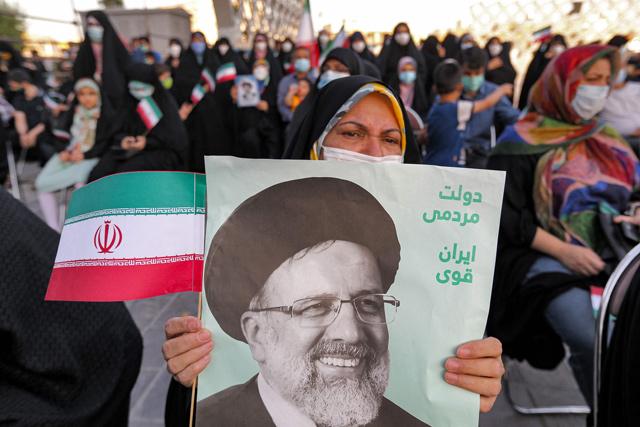You are here
Iran ultraconservative Raisi inaugurated as president
By AFP - Aug 03,2021 - Last updated at Aug 03,2021
TEHRAN — Ultraconservative Ebrahim Raisi was on Tuesday inaugurated as president of Iran, a country whose hopes of shaking off a dire economic crisis hinge on reviving a nuclear deal with world powers.
"Following the people's choice, I task the wise, indefatigable, experienced and popular Hojatoleslam Ebrahim Raisi as president of the Islamic Republic of Iran," the country's Supreme Leader Ayatollah Ali Khamenei wrote in a decree read out by his chief of staff.
Raisi replaces moderate president Hassan Rouhani, whose landmark achievement was the 2015 nuclear agreement between Iran and six world powers.
From the outset, Raisi will have to tackle negotiations aimed at reviving the nuclear deal from which the US unilaterally withdrew imposing sweeping sanctions.
The 60-year-old also faces warnings to Iran from the United States, Britain and Israel over a deadly tanker attack last week for which Tehran denies responsibility.
Raisi, in his inauguration speech, said the new government would seek to lift "oppressive" US sanctions, but would "not tie the nation's standard of living to the will of foreigners".
“We believe the people’s economic position is unfavourable both because of the hostility of our enemies and because of the shortcomings and problems inside the country,” he said.
In his response, Khamenei acknowledged Iran suffered from “many shortcomings and problems”, but quickly added: “The country’s capabilities are even more numerous.”
“Fixing” economic problems takes time and cannot be done overnight,” he said.
Raisi won a presidential election in June in which more than half the electorate stayed away after many heavyweights were barred from standing.
A former judiciary chief, he has been criticised by the West for his human rights record.
Tuesday’s ceremony marked Raisi’s formal accession to office. He will next be sworn in before parliament on Thursday when he is to submit his proposed government line-up.
Economy top challenge
Raisi’s presidency will consolidate power in the hands of conservatives following their 2020 parliamentary election victory, marked by the disqualification of thousands of reformist or moderate candidates.
Iran’s economic woes, exacerbated by US sanctions, will be the new president’s top challenge, said Clement Therme, a researcher at the European University Institute in Italy.
“His main objective will be to improve the economic situation by reinforcing the Islamic republic’s economic relations with neighbouring countries” and others such as Russia and China, Therme said.
The 2015 deal saw Iran accept curbs on its nuclear capabilities in return for an easing of sanctions.
But then US president Donald Trump withdrew from the accord three years later and ramped up sanctions again, prompting Tehran to pull back from most of its nuclear commitments.
Trump’s successor Joe Biden has signalled his readiness to return to the deal and engaged in indirect negotiations with Iran alongside formal talks with the accord’s remaining parties — Britain, China, France, Germany and Russia.
The US sanctions have choked Iran and its vital oil exports, and the economy contracted by more than 6 per cent in both 2018 and 2019.
US warns of ‘appropriate response’
In the winter of 2017-2018, and again in 2019, street protests sparked by the economic crisis rocked the country.
And last month, demonstrators in oil-rich Khuzestan province, which has been hit by drought, took to the streets to vent their anger.
On the foreign front, tensions have escalated after the US and Britain joined Israel in blaming Tehran for the tanker attack off Oman last Thursday that killed a British security guard and a Romanian crew member.
The United States vowed an “appropriate response”, while Iran warned on Monday that it will respond to any “adventurism”.
The economic malaise has been exacerbated by the coronavirus pandemic, which has officially cost more than 90,000 lives and also hit many Iranians in the pocket.
In his final cabinet meeting on Sunday, Rouhani defended his track record but apologised over the “hardships” Iranians have had to endure.
After his election, Raisi made clear that his key foreign policy would be to improve ties with regional countries.
In mid-July, Rouhani said he hoped his successor can clinch a deal to lift US sanctions and conclude nuclear talks.
But Khamenei, whose word is final in policy matters, has warned against trusting the West.
Raisi’s inauguration appears to have done little to raise hopes on Tehran’s streets.
“I’m optimistic about the future, but I admit I would be exaggerating if I said he could really do something,” Hassan, a 55-year-old jeweller, told AFP.
Manijeh, a 60-year-old housewife, said that “even though he may be a good and honest person, there is still nothing he can do because the situation is fundamentally bad”.
Related Articles
TEHRAN — Iran’s ultraconservatives on Sunday hailed the election victory of their candidate Ebrahim Raisi, after Washington charged the vote
TEHRAN — While the world impatiently awaits Iran’s return to nuclear talks, ultraconservative new President Ebrahim Raisi has instead turned
TEHRAN — Ultraconservative cleric Ebrahim Raisi was declared the winner Saturday of Iran's presidential election, a widely anticipated resul

















